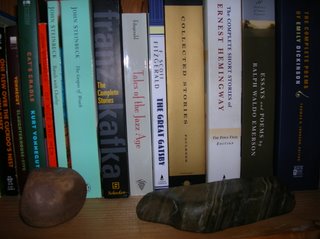Scholarly Shenanigans
 Last week I started reading the great American novel, “The Great Gatsby” by F. Scott Fitzgerald. Several people who have spied me reading this book have made such comments as, “I read it, wasn’t impressed” or more blatantly, “That book sucks.” But the most common and disturbing of all comments I’ve heard is that it reads “too slow and jumps around.”
Last week I started reading the great American novel, “The Great Gatsby” by F. Scott Fitzgerald. Several people who have spied me reading this book have made such comments as, “I read it, wasn’t impressed” or more blatantly, “That book sucks.” But the most common and disturbing of all comments I’ve heard is that it reads “too slow and jumps around.”It really irks me that some people, especially English majors, take such an elitist attitude towards literature. I suppose that in any field of interest there will always be those who think they know the facts more than the rest. But with books, I’m afraid there aren’t that many facts other than what MLA can give us. The rest is open to interpretation and the value (or lack thereof) of a book is definitely in the eye of the beholder. But why do most beholders need to feel superior among comrades of the same interest?
So far “Gatsby” proves to be interesting and full of that certain something that I like so much about F. Scott Fitzgerald. I heard once that Hunter S. Thompson would bang out a copy of a chapter or two of “The Great Gatsby” whenever he needed some inspiration. That’s one of the reasons I decided to give it a read. Back in 2003, I spent the autumn months deeply immersed in all those 1920s avant-garde, expatriate writers. I read mostly short stories by these writers and came away with a profound liking for Hemingway and Fitzgerald.
Personally there aren’t many books written in English that I find unreadable. A bad book is worth something, simply because it evokes some kind of emotion be it positive or negative. Even Jane Austen, whose books I find to be the most incredibly boring and dry critiques of English family, economy and society, are fairly easy (if not tedious) to get through.
What about James Joyce? If you think Fitzgerald is jumpy, try out “A Portrait of the Artist as a Young Man” or “Ulysses.” You will definitely learn the true definition of jumpy and frustration. I read “Portrait” in a few sittings and though I don’t declare to completely understand everything about it, I got the gist of it and might read it again someday. I have attempted “Ulysses” about three times, ending each time with a more deeply rooted hatred for James Joyce. However, I absolutely love these people who claim to have read all 900+ pages without a problem.
Whenever I hear someone, especially my age, discussing “Ulysses” as if they have read it, I am always eager to question them thoroughly. When I ask what it was about (pretending to be entirely ignorant of the book), the best answer I have received so far is “Oh, I read it a long time ago, I don’t really remember.”
That’s when I get out my wading boots. You know, those boots you put on when you have to wade through a room full of bullshit?


0 Comments:
Post a Comment
<< Home